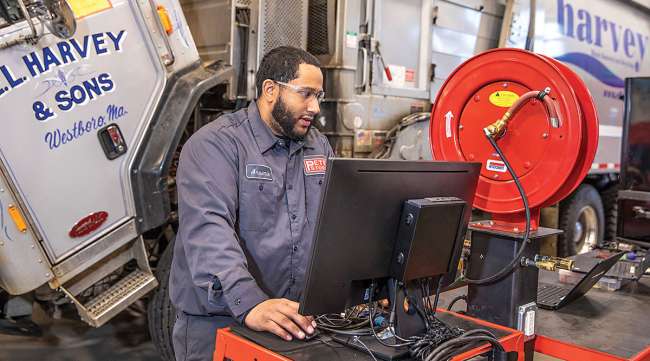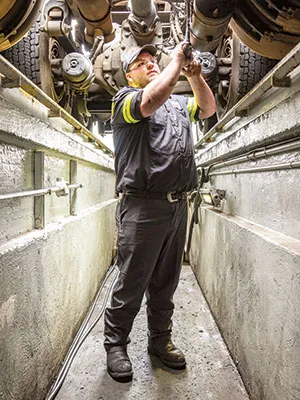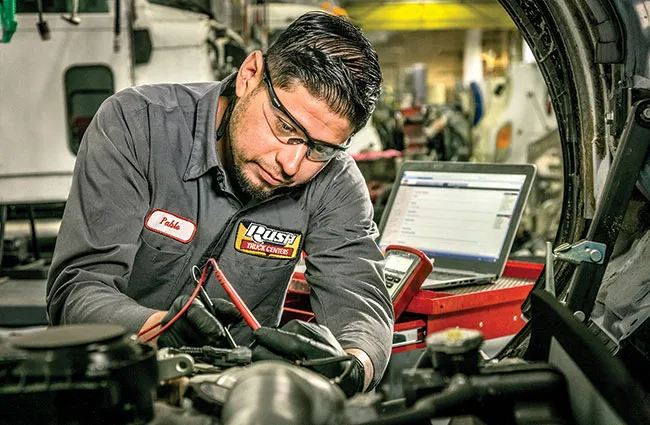Senior Reporter
FMCSA Plans Study on Vehicle Maintenance Impact on Safety

[Stay on top of transportation news: Get TTNews in your inbox.]
The Federal Motor Carrier Safety Administration announced a plan to conduct a survey and study that focuses on how vehicle maintenance requirements impact overall motor carrier safety.
“The study goal is to determine what improvements, ranging from better compliance interventions to better vehicle maintenance requirements, would enhance motor carrier safety,” said a Sept. 1 FMCSA Federal Register notice.
FMCSA said that in 2014, the John A. Volpe National Transportation Systems Center conducted a study to assess the effectiveness of the Safety Measurement System in identifying the highest risk motor carriers targeted for interventions.
“One finding from the study was that motor carriers targeted for intervention due to vehicle maintenance violations had a 65% higher crash rate compared to the national average,” FMCSA said.
The violations were based on federal and state inspections of components critical to the safe operation of the vehicle.
“It is important to recognize that proper and regular preventative maintenance — that is systematic maintenance programs among carriers — rather than federal and state inspections that are by nature limited to the most visible or obvious safety-related components, should be the primary activity applied to ensure safe equipment operation.

According to a 2014 study, motor carriers targeted for intervention due to vehicle maintenance violations had a 65% higher crash rate compared with the national average. (Averitt Express)
“While these initial findings are important, they raise additional questions,” the agency said.
One of those questions is related to a regulatory stipulation that states every carrier must have a program to “systematically inspect, repair and maintain, or cause to be systematically inspected, repaired and maintained, all motor vehicles and intermodal equipment subject to its control.”
Though the regulation provides some direction, there is no supporting definition of the word systematic, and because the term is subjective, it is likely to vary from one carrier to another, FMCSA said.
“The lack of specificity regarding standard intervals for preventative maintenance makes it difficult for federal and state personnel to evaluate the effectiveness of and compliance with a carrier’s maintenance program.
“Furthermore, the lack of specificity may make it difficult for carriers to ascertain and therefore comply with the regulation’s intent,” it said.

FMCSA said there is a lack of specificity regarding standard intervals for preventative maintenance. (Rush Enterprises)
FMCSA said the study’s objectives include:
• Develop an operational definition of systematic maintenance.
• Evaluate whether current regulations and the intervention process could be modified to improve compliance with such vehicle maintenance requirements as preventative maintenance intervals, and preventative maintenance inspections with adequately trained mechanics and adequate maintenance facilities.
• Gather information to assist in establishing minimum standards for inspection intervals, mechanic qualifications and training, and certification of maintenance facilities.

Transport Topics' Seth Clevenger, Michael Freeze and Mike Senatore dissect the new Top 100 list of the largest private carriers, including how fleets are adapting to this softened market. Tune in above or by going to RoadSigns.ttnews.com.
Under contract to FMCSA, the Virginia Tech Transportation Institute at the Virginia Polytechnic Institute and State University will use online surveys to obtain the data required to address the study objectives. The information collection will be administered in two phases.
The first phase calls for a voluntary seven-question online recruitment survey that will screen carriers and verify their eligibility for Phase II participation.
Phase II, a voluntary 108-question survey, will include questions about demographics; maintenance practices, intervals, personnel and facilities; and state and federal inspections, among other things. The Phase II survey, which will include carriers of all sizes, will provide additional information about maintenance personnel and facilities, mechanic training levels, tools required for adequate inspection, certification of facilities and vehicle maintenance issues that may impact safety.
Want more news? Listen to today's daily briefing above or go here for more info
FMCSA said the results of the information collection will be documented in a technical report to be published by the agency.
“In addition, the results will be used to create a ‘recommended best practices’ report that will outline minimum standards for inspection intervals, mechanic qualifications and training, and certification of maintenance facilities,” it said.
“If this data collection does not take place, the truck and bus industry would continue to operate with the uncertainty of what a ‘systematic maintenance’ program is. This term’s ambiguous definition makes it difficult for federal and state inspectors to evaluate the effectiveness of a carrier’s maintenance program or its compliance with this provision. Furthermore, this uncertainty may make it difficult for carriers to ascertain and therefore comply with the regulation’s intent,” FMCSA concluded.




